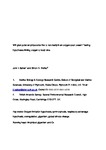Will giant polar amphipods be first to fare badly in an oxygen-poor ocean? Testing hypotheses linking oxygen to body size
| dc.contributor.author | Spicer, John | |
| dc.contributor.author | Morley, SA | |
| dc.date.accessioned | 2019-06-20T19:09:16Z | |
| dc.date.available | 2019-06-20T19:09:16Z | |
| dc.date.issued | 2019-08 | |
| dc.identifier.issn | 0962-8436 | |
| dc.identifier.issn | 1471-2970 | |
| dc.identifier.other | 20190034 | |
| dc.identifier.uri | http://hdl.handle.net/10026.1/14347 | |
| dc.description.abstract |
<jats:p> It has been suggested that giant Antarctic marine invertebrates will be particularly vulnerable to declining O <jats:sub>2</jats:sub> levels as our ocean warms in line with current climate change predictions. Our study provides some support for this oxygen limitation hypothesis, with larger body sizes being generally more sensitive to O <jats:sub>2</jats:sub> reductions than smaller body sizes. However, it also suggests that the overall picture is a little more complex. We tested predictions from three different, but overlapping, O <jats:sub>2</jats:sub> -related hypotheses accounting for gigantism, using four Antarctic amphipod species encompassing a wide range of body sizes. We found a significant effect of body size, but also of species, in their respiratory responses to acutely declining O <jats:sub>2</jats:sub> tensions. The more active lifestyle of intermediate-sized <jats:italic>Prostebbingia brevicornis</jats:italic> was supported by a better respiratory performance than predicted by the oxygen limitation hypothesis alone, but consistent with the symmorphosis hypothesis. We suggest that giant polar amphipods are likely to be some of the first to fare badly in an O <jats:sub>2</jats:sub> -poor ocean. However, the products of past evolutionary innovation, such as respiratory pigments that enhance O <jats:sub>2</jats:sub> -transport and novel gas exchange structures, may in some species offset any respiratory disadvantages of either large or small body size. </jats:p> <jats:p>This article is part of the theme issue ‘Physiological diversity, biodiversity patterns and global climate change: testing key hypotheses involving temperature and oxygen’.</jats:p> | |
| dc.format.extent | 0-0 | |
| dc.format.medium | Print-Electronic | |
| dc.language | en | |
| dc.language.iso | en | |
| dc.publisher | Royal Society, The | |
| dc.subject | oxygen limitation hypothesis | |
| dc.subject | Symmorphosis | |
| dc.subject | respiratory advantage hypothesis | |
| dc.subject | oxyregulation | |
| dc.subject | gigantism | |
| dc.subject | global climate change | |
| dc.title | Will giant polar amphipods be first to fare badly in an oxygen-poor ocean? Testing hypotheses linking oxygen to body size | |
| dc.type | journal-article | |
| dc.type | Journal Article | |
| dc.type | Research Support, Non-U.S. Gov't | |
| plymouth.author-url | https://www.webofscience.com/api/gateway?GWVersion=2&SrcApp=PARTNER_APP&SrcAuth=LinksAMR&KeyUT=WOS:000473329200010&DestLinkType=FullRecord&DestApp=ALL_WOS&UsrCustomerID=11bb513d99f797142bcfeffcc58ea008 | |
| plymouth.issue | 1778 | |
| plymouth.volume | 374 | |
| plymouth.publication-status | Published | |
| plymouth.journal | Philosophical Transactions of the Royal Society B: Biological Sciences | |
| dc.identifier.doi | 10.1098/rstb.2019.0034 | |
| plymouth.organisational-group | /Plymouth | |
| plymouth.organisational-group | /Plymouth/Faculty of Science and Engineering | |
| plymouth.organisational-group | /Plymouth/Faculty of Science and Engineering/School of Biological and Marine Sciences | |
| plymouth.organisational-group | /Plymouth/REF 2021 Researchers by UoA | |
| plymouth.organisational-group | /Plymouth/REF 2021 Researchers by UoA/UoA07 Earth Systems and Environmental Sciences | |
| plymouth.organisational-group | /Plymouth/Research Groups | |
| plymouth.organisational-group | /Plymouth/Research Groups/Marine Institute | |
| plymouth.organisational-group | /Plymouth/Users by role | |
| plymouth.organisational-group | /Plymouth/Users by role/Academics | |
| dc.publisher.place | England | |
| dcterms.dateAccepted | 2019-03-25 | |
| dc.rights.embargodate | 2019-9-3 | |
| dc.identifier.eissn | 1471-2970 | |
| dc.rights.embargoperiod | Not known | |
| rioxxterms.versionofrecord | 10.1098/rstb.2019.0034 | |
| rioxxterms.licenseref.uri | http://www.rioxx.net/licenses/all-rights-reserved | |
| rioxxterms.licenseref.startdate | 2019-08 | |
| rioxxterms.type | Journal Article/Review |


